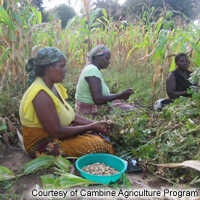Cambine Agriculture Program

Project Information
Supporting food security and rural community agricultural training for sustainability.
Describe the need affecting community
How will this Advance project help to address the need?
The Cambine Agriculture program proposes to increase the crop and animal production on the United Methodist farm land through acquiring reliable water and proper irrigation system, the rehabilitation of the farm infrastructure and increase the capital investment for the production and using good and sustainable practice of production. Also this project proposes to extend intensively the agricultural training program to the rural communities. This program will deals: – with the trainers of trainees, church and community leaders and the community members through the farmers’ field schools; – Purchase and distribution of the basic agricultural input (like tools, improved seeds and fruit tree seedlings). These fruit tree seedlings will help to build up a long term sustainable income source that can be called as the “Rural Bank” for the rural communities); – A basic nutritional training that will be delivered to all the participants in order to improve their nutritional status with the incorporation Moringa in the diet. This agricultural training of the communities will be using an integrated approach that will focus on the sustainable agriculture principles of production. The following will be some of the main topics that will constitute the training curriculum: – site selection and preparation; – Seed selection; – Making compost and how to use it; – Making organic pesticides and how to use them; – the use of the technique of mulching, – Introduction of some of the cover crops like mucuna, titonia, etc; – and the introduction of the basic knowledge on the crop rotation and diversity (for the soil improvement and prevention of crop diseases and increase the diversity in the diet); – Training on taking agricultural activities as a business as marketing; and lastly basic information on the rural development will be delivered especially to the community and church leaders. The project will train the community members on the dynamism of the groups so that the communities may get the spirit of making groups, mutuality or associations for the mutual assistance and solving the problem of the market of the agricultural products and or facilitating of the loans to the groups for the special small group project. Also special training will also focus on the growing fruit trees especially coconut trees that will constitute the “rural bank” for the long term sustainability of the rural communities.
Describe the primary goal of the project
The primary goals of the Cambine agriculture program are: 1. Produce reliable and enough food to ensure that the communities of Cambine Educational mission Center are food secured. These Community members include: Orphans, students of the theological seminary and the New United Methodist University of Mozambique and the students of the boarding schools as well as the community of the Health Center of Cambine and staffs of these different departments. 2. Provide an agricultural training environment to the students of Cambine educational mission center for the future transformations of their communities, 3. Generate bit of increase to sustain the UMC farm project. 4. Build the capacity of rural farmers of Cambine for the restoration of the Agriculture livelihoods. It means that the program will focus on transition of knowledge and practice of famers from viewing farming not only as a source of food incomes, but also as a complete system of livelihood where there is production of raw material, employment, manufacturing, marketing, money transactions and general wealth creation. The project GOAL will therefore impact on the general well-being of the community by reducing vulnerability, increased wealth and improved health.
Describe the change you would like to see in the community as a result of this Advance project
A baseline line will be done before the implementation of the project. The data of this baseline survey will be kept, to help make comparison with the data of the end line survey. The different will show if the project had impacted the beneficiaries positively or not.

